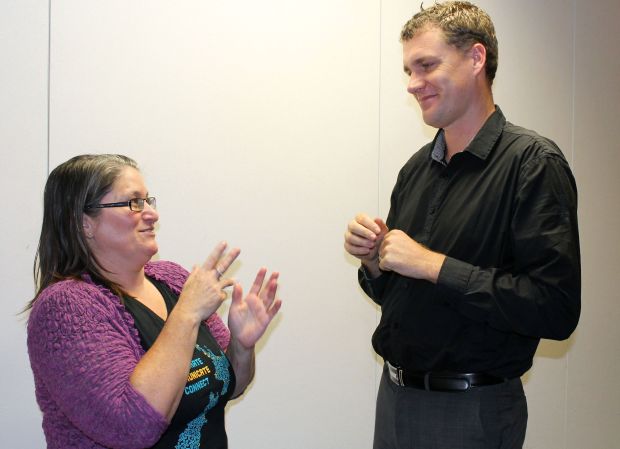
Staff at Pegasus Health signing "ambulance"
If these staff members at Pegasus Health in Christchurch have a favourite New Zealand Sign Language sign, it might just be "ambulance". The group learnt signs relevant to their profession at a recent taster class run by Deaf Aotearoa during New Zealand Sign Language Week. As the annual event draws to a close, there have been numerous classes and activities throughout the country to promote New Zealand's third official language. The 2013 Census showed the numbers of sign language users had fallen by 16 percent but there are still more than 20,000 people who use it.
 Deaf Aotearoa's community relations officer, Victoria Green, says while it’s still rare to happen upon someone who signs, interest in taster classes for community organisations has greatly increased. The free lessons can be tailored to individual industries: in this case Pegasus staff learnt how to ask a patient what was painful and whether they wanted a doctor, nurse or sign language interpreter.
Deaf Aotearoa's community relations officer, Victoria Green, says while it’s still rare to happen upon someone who signs, interest in taster classes for community organisations has greatly increased. The free lessons can be tailored to individual industries: in this case Pegasus staff learnt how to ask a patient what was painful and whether they wanted a doctor, nurse or sign language interpreter.
After the class, staff described the experience as useful and the signs, intuitive. Ally Way said the course was interactive and the signs were easy to follow. "The symbols and the moves are things that you would expect them to be – it’s not something that is particularly out there," she said
Jo Butterfield said the fact that the signs were repeated several times helped her to remember them which was important when learning a new language. And she said, as a nursing facilitator dealing with practice nurses, she would have occasion to use what she’d learnt. "It will be good to go out and inform them that these courses are available and that they're easy to access and could be really useful."
The organisation's Population Health Specialist, Lynley Cook, says Pegasus has previously offered longer classes and deaf awareness workshops for about 100 general practitioners, practice nurses and pharmacists. And she says the feedback has been very positive. "They've been really pleased with what they've learnt. [ ] They have commented back to us that they feel more confident in being able to work with people who are deaf."

Anna Tyler signs "hospital", "nurse", "interpreter" and "help"
Victoria Green says the Deaf Awareness Workshops teach participants how to approach deaf clients or patients. They also offer practical tips such as not signing in front of a window as this darkens the face and makes it harder to pick up facial expressions which are also part of New Zealand Sign Language.
Giving Deaf People a Voice
For many in the deaf community, a visit to the doctor, dentist or a parent/teacher meeting involves having an interpreter come along too. Victoria Green says she always books an interpreter to ensure she has the best possible information. She says, just recently the Ministry of Education has provided funding to cover interpreters attending parent/teachers interviews for the deaf parents of hearing children.
And she has used it with her own daughter's teacher. "It’s been fantastic having an interpreter in the school environment with the teacher." She says many deaf parents don't have full awareness of school activities and she says they don't always understand the reports that come home. "So a parent/teacher interview helps them clarify that and understand what's going on in the school."
Jeremy Borland is a freelance interpreter who works for Isign, the nationwide booking service. His sister is profoundly deaf and he grew up using New Zealand Sign Language in the home. "Quite often we were lazy and we wouldn't sign at all which would frustrate [my sister] and so, every dinner time became a time where nobody was allowed to speak - it was voice-off time." This led him to study interpreting which he says is varied work involving anything from personal appointments to court and police jobs, but all are confidential, as required by the Interpreter's Code of Ethics.

Victoria Green and Jeremy Borland
He says one of the rewards of the job is offering a means of communication to the deaf community as in some cases, individuals have grown up without being able to express what they think and feel. "Being able to give them that access, I suppose, to be able to say what they want and make decisions for themselves [ ] on an equal footing. It’s a very satisfying part of the job." Jeremy attracted attention of his own after the Canterbury earthquakes. His signing at emergency briefings drew a Facebook following and some referred to him as "Hot Jeremy". He says, as a private person, he found this difficult to navigate and he felt it was also contrary to the goals of interpreting. "We're trying to empower a deaf person to have a voice and be heard. So it’s quite counter that when all this attention suddenly comes on me as the interpreter, when in my job I'm always try to promote a deaf person to have that power."

